Introduction to Management (BUS020C414H) - Imperial Hotel Report
VerifiedAdded on 2023/01/18
|10
|2289
|74
Report
AI Summary
This report presents a comprehensive analysis of the management issues at the Imperial Hotel, a London-based establishment facing operational challenges, poor customer service, and high operating costs. The analysis delves into the internal and external business environment, utilizing Porter's Five Forces to assess the competitive landscape and identify key threats and opportunities. The core problems identified include high staff turnover, negative work culture, and ineffective leadership, leading to operational inefficiencies and declining profits. The report explores management theories, including Taylor's 5 Principles, Mintzberg's interpersonal roles, and situational leadership approaches, to propose solutions. Key recommendations include improving staff retention through competitive compensation, fostering a positive work culture through ethical leadership, and implementing in-house training programs. The report also suggests new recruitment policies and performance measurement techniques to improve employee performance and overall organizational effectiveness. The conclusion emphasizes the importance of effective management practices in achieving organizational goals and improving the brand image of the hotel.
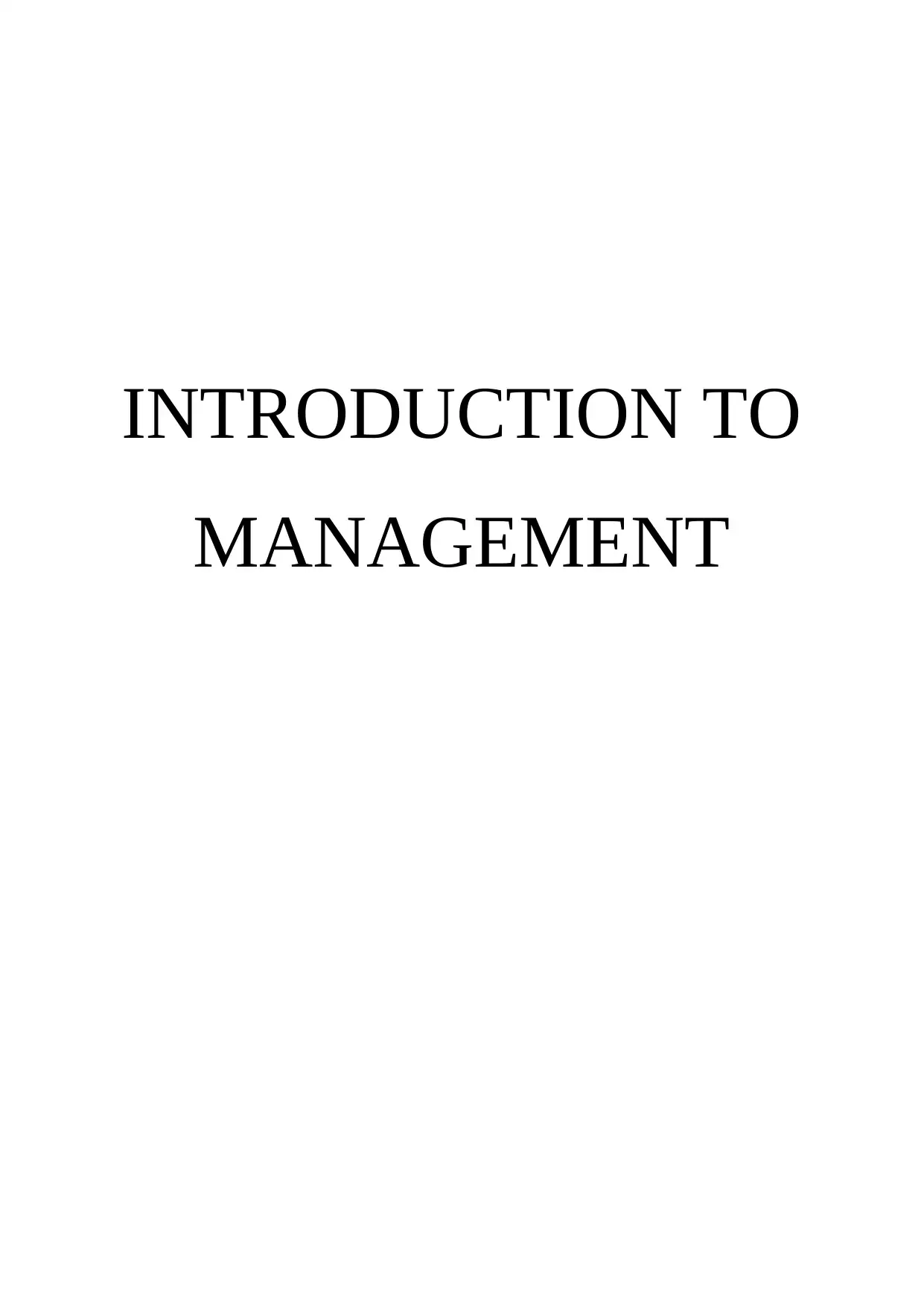
INTRODUCTION TO
MANAGEMENT
MANAGEMENT
Paraphrase This Document
Need a fresh take? Get an instant paraphrase of this document with our AI Paraphraser
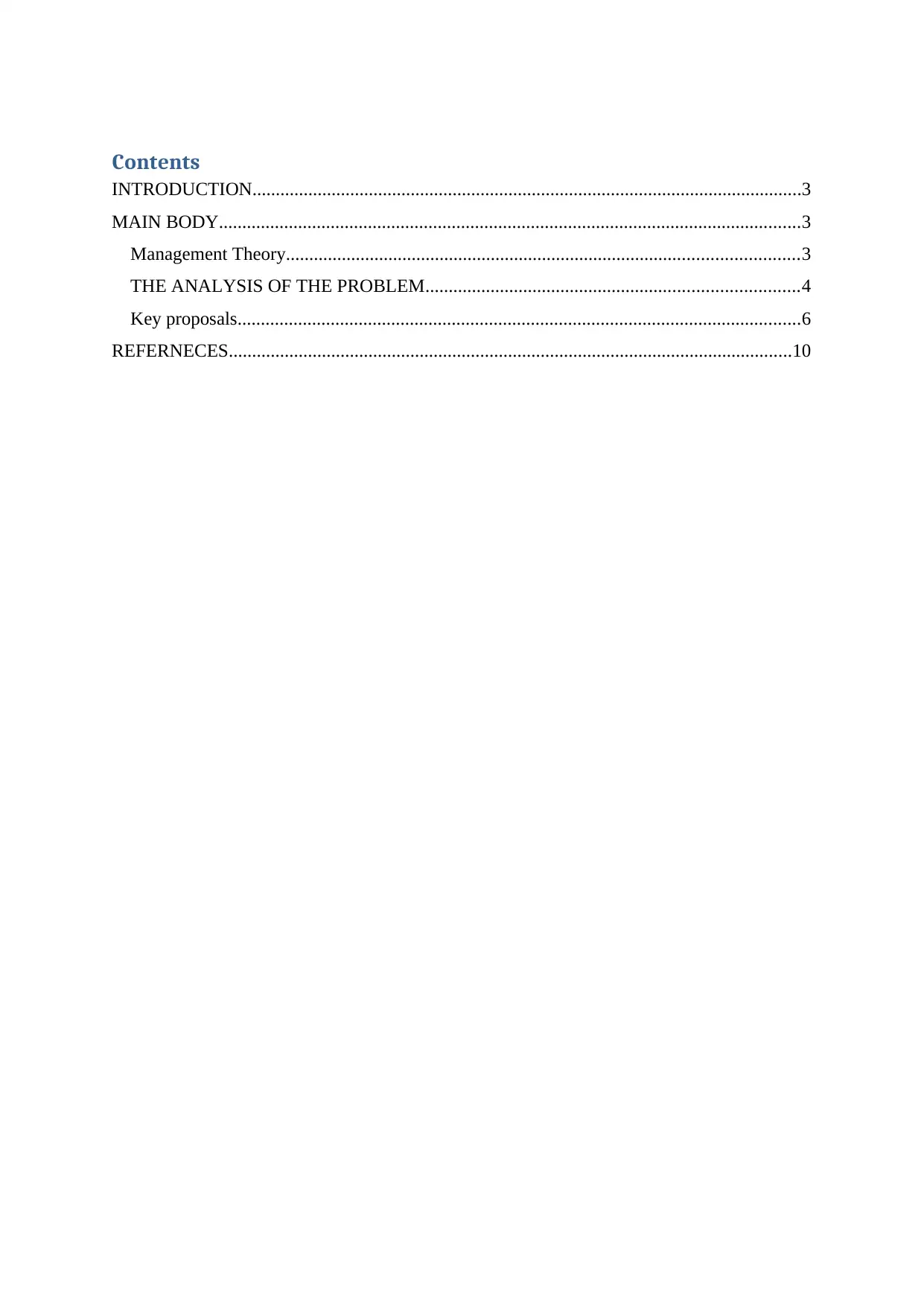
Contents
INTRODUCTION......................................................................................................................3
MAIN BODY.............................................................................................................................3
Management Theory..............................................................................................................3
THE ANALYSIS OF THE PROBLEM................................................................................4
Key proposals.........................................................................................................................6
REFERNECES.........................................................................................................................10
INTRODUCTION......................................................................................................................3
MAIN BODY.............................................................................................................................3
Management Theory..............................................................................................................3
THE ANALYSIS OF THE PROBLEM................................................................................4
Key proposals.........................................................................................................................6
REFERNECES.........................................................................................................................10
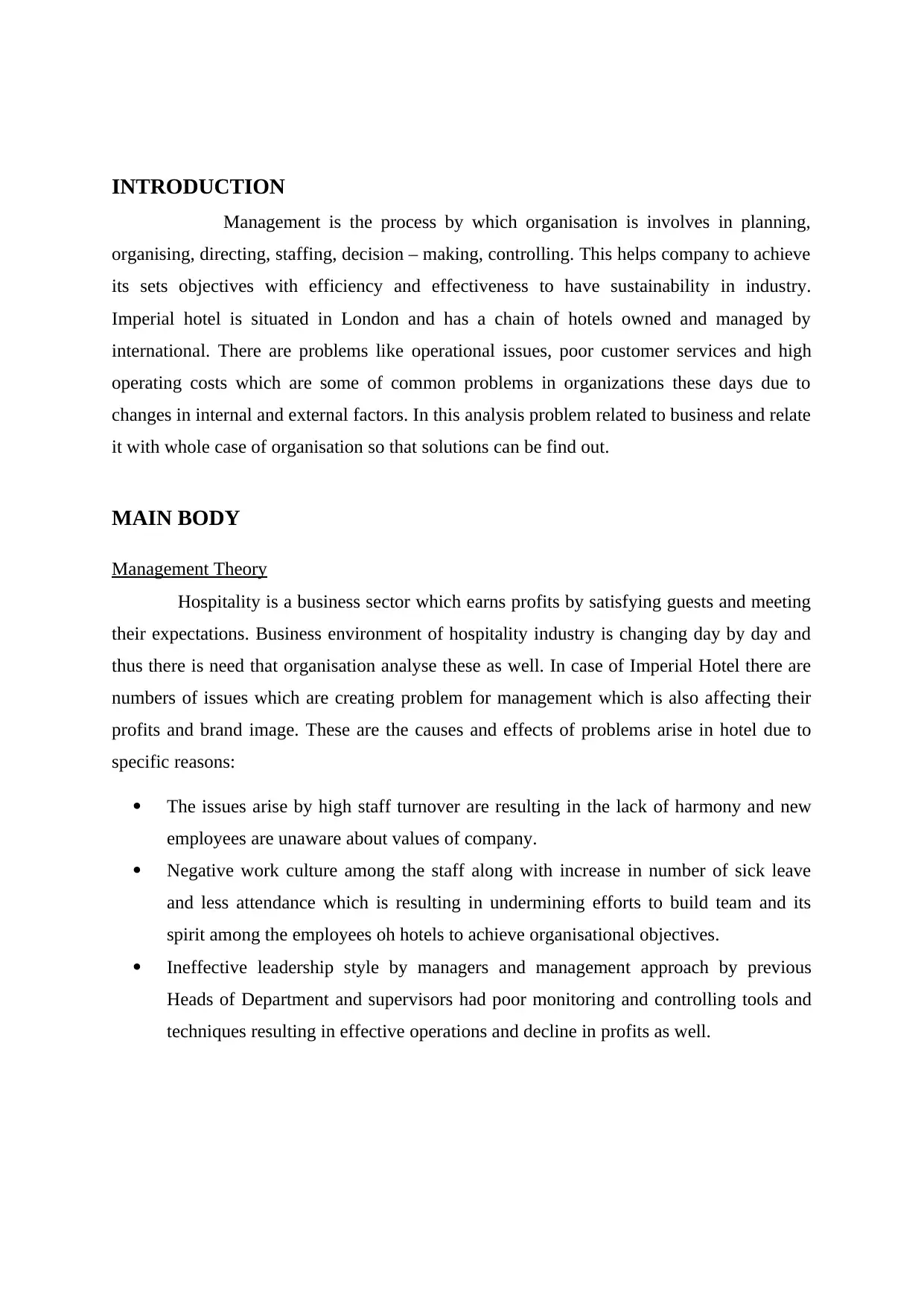
INTRODUCTION
Management is the process by which organisation is involves in planning,
organising, directing, staffing, decision – making, controlling. This helps company to achieve
its sets objectives with efficiency and effectiveness to have sustainability in industry.
Imperial hotel is situated in London and has a chain of hotels owned and managed by
international. There are problems like operational issues, poor customer services and high
operating costs which are some of common problems in organizations these days due to
changes in internal and external factors. In this analysis problem related to business and relate
it with whole case of organisation so that solutions can be find out.
MAIN BODY
Management Theory
Hospitality is a business sector which earns profits by satisfying guests and meeting
their expectations. Business environment of hospitality industry is changing day by day and
thus there is need that organisation analyse these as well. In case of Imperial Hotel there are
numbers of issues which are creating problem for management which is also affecting their
profits and brand image. These are the causes and effects of problems arise in hotel due to
specific reasons:
The issues arise by high staff turnover are resulting in the lack of harmony and new
employees are unaware about values of company.
Negative work culture among the staff along with increase in number of sick leave
and less attendance which is resulting in undermining efforts to build team and its
spirit among the employees oh hotels to achieve organisational objectives.
Ineffective leadership style by managers and management approach by previous
Heads of Department and supervisors had poor monitoring and controlling tools and
techniques resulting in effective operations and decline in profits as well.
Management is the process by which organisation is involves in planning,
organising, directing, staffing, decision – making, controlling. This helps company to achieve
its sets objectives with efficiency and effectiveness to have sustainability in industry.
Imperial hotel is situated in London and has a chain of hotels owned and managed by
international. There are problems like operational issues, poor customer services and high
operating costs which are some of common problems in organizations these days due to
changes in internal and external factors. In this analysis problem related to business and relate
it with whole case of organisation so that solutions can be find out.
MAIN BODY
Management Theory
Hospitality is a business sector which earns profits by satisfying guests and meeting
their expectations. Business environment of hospitality industry is changing day by day and
thus there is need that organisation analyse these as well. In case of Imperial Hotel there are
numbers of issues which are creating problem for management which is also affecting their
profits and brand image. These are the causes and effects of problems arise in hotel due to
specific reasons:
The issues arise by high staff turnover are resulting in the lack of harmony and new
employees are unaware about values of company.
Negative work culture among the staff along with increase in number of sick leave
and less attendance which is resulting in undermining efforts to build team and its
spirit among the employees oh hotels to achieve organisational objectives.
Ineffective leadership style by managers and management approach by previous
Heads of Department and supervisors had poor monitoring and controlling tools and
techniques resulting in effective operations and decline in profits as well.
⊘ This is a preview!⊘
Do you want full access?
Subscribe today to unlock all pages.

Trusted by 1+ million students worldwide
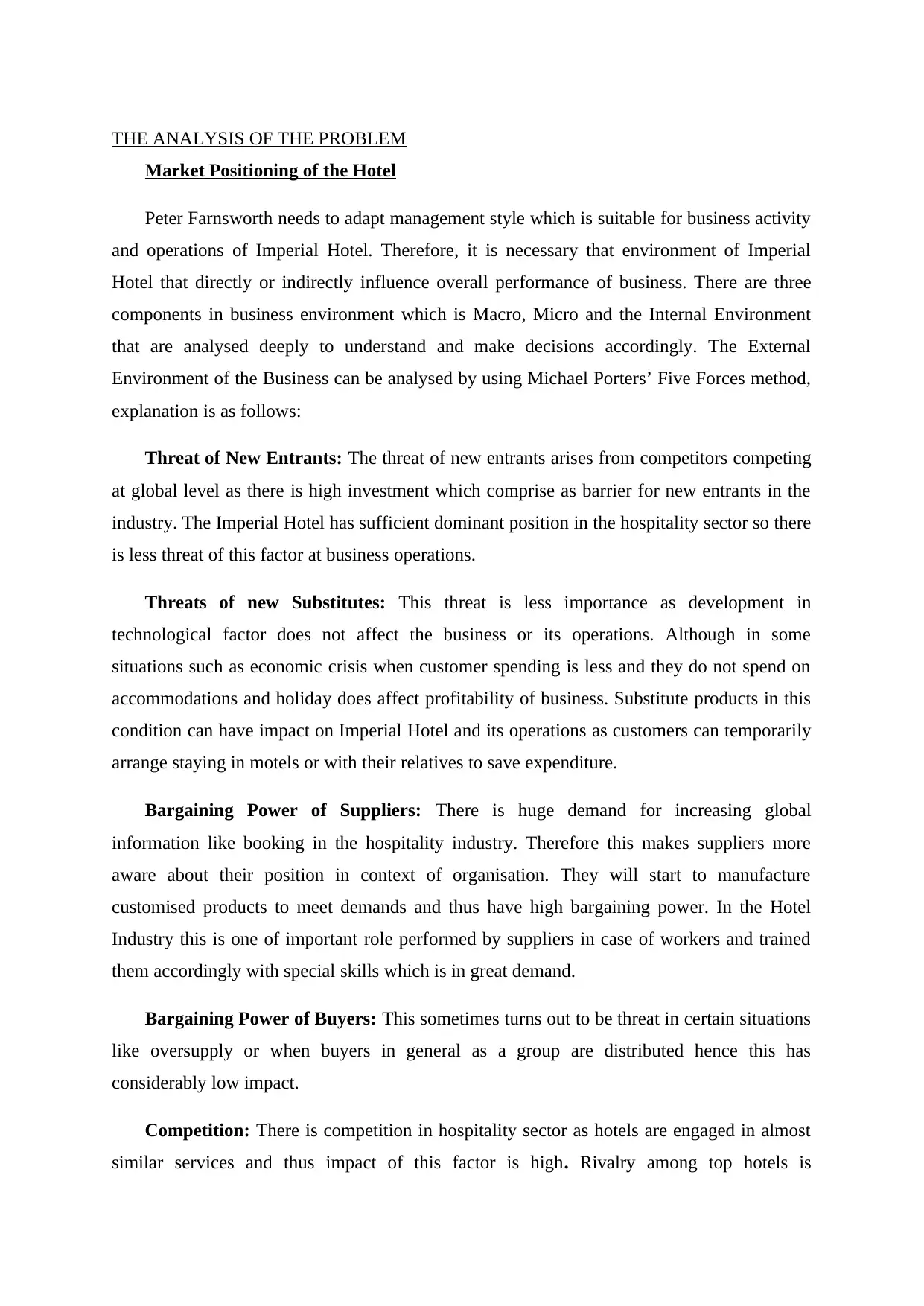
THE ANALYSIS OF THE PROBLEM
Market Positioning of the Hotel
Peter Farnsworth needs to adapt management style which is suitable for business activity
and operations of Imperial Hotel. Therefore, it is necessary that environment of Imperial
Hotel that directly or indirectly influence overall performance of business. There are three
components in business environment which is Macro, Micro and the Internal Environment
that are analysed deeply to understand and make decisions accordingly. The External
Environment of the Business can be analysed by using Michael Porters’ Five Forces method,
explanation is as follows:
Threat of New Entrants: The threat of new entrants arises from competitors competing
at global level as there is high investment which comprise as barrier for new entrants in the
industry. The Imperial Hotel has sufficient dominant position in the hospitality sector so there
is less threat of this factor at business operations.
Threats of new Substitutes: This threat is less importance as development in
technological factor does not affect the business or its operations. Although in some
situations such as economic crisis when customer spending is less and they do not spend on
accommodations and holiday does affect profitability of business. Substitute products in this
condition can have impact on Imperial Hotel and its operations as customers can temporarily
arrange staying in motels or with their relatives to save expenditure.
Bargaining Power of Suppliers: There is huge demand for increasing global
information like booking in the hospitality industry. Therefore this makes suppliers more
aware about their position in context of organisation. They will start to manufacture
customised products to meet demands and thus have high bargaining power. In the Hotel
Industry this is one of important role performed by suppliers in case of workers and trained
them accordingly with special skills which is in great demand.
Bargaining Power of Buyers: This sometimes turns out to be threat in certain situations
like oversupply or when buyers in general as a group are distributed hence this has
considerably low impact.
Competition: There is competition in hospitality sector as hotels are engaged in almost
similar services and thus impact of this factor is high. Rivalry among top hotels is
Market Positioning of the Hotel
Peter Farnsworth needs to adapt management style which is suitable for business activity
and operations of Imperial Hotel. Therefore, it is necessary that environment of Imperial
Hotel that directly or indirectly influence overall performance of business. There are three
components in business environment which is Macro, Micro and the Internal Environment
that are analysed deeply to understand and make decisions accordingly. The External
Environment of the Business can be analysed by using Michael Porters’ Five Forces method,
explanation is as follows:
Threat of New Entrants: The threat of new entrants arises from competitors competing
at global level as there is high investment which comprise as barrier for new entrants in the
industry. The Imperial Hotel has sufficient dominant position in the hospitality sector so there
is less threat of this factor at business operations.
Threats of new Substitutes: This threat is less importance as development in
technological factor does not affect the business or its operations. Although in some
situations such as economic crisis when customer spending is less and they do not spend on
accommodations and holiday does affect profitability of business. Substitute products in this
condition can have impact on Imperial Hotel and its operations as customers can temporarily
arrange staying in motels or with their relatives to save expenditure.
Bargaining Power of Suppliers: There is huge demand for increasing global
information like booking in the hospitality industry. Therefore this makes suppliers more
aware about their position in context of organisation. They will start to manufacture
customised products to meet demands and thus have high bargaining power. In the Hotel
Industry this is one of important role performed by suppliers in case of workers and trained
them accordingly with special skills which is in great demand.
Bargaining Power of Buyers: This sometimes turns out to be threat in certain situations
like oversupply or when buyers in general as a group are distributed hence this has
considerably low impact.
Competition: There is competition in hospitality sector as hotels are engaged in almost
similar services and thus impact of this factor is high. Rivalry among top hotels is
Paraphrase This Document
Need a fresh take? Get an instant paraphrase of this document with our AI Paraphraser
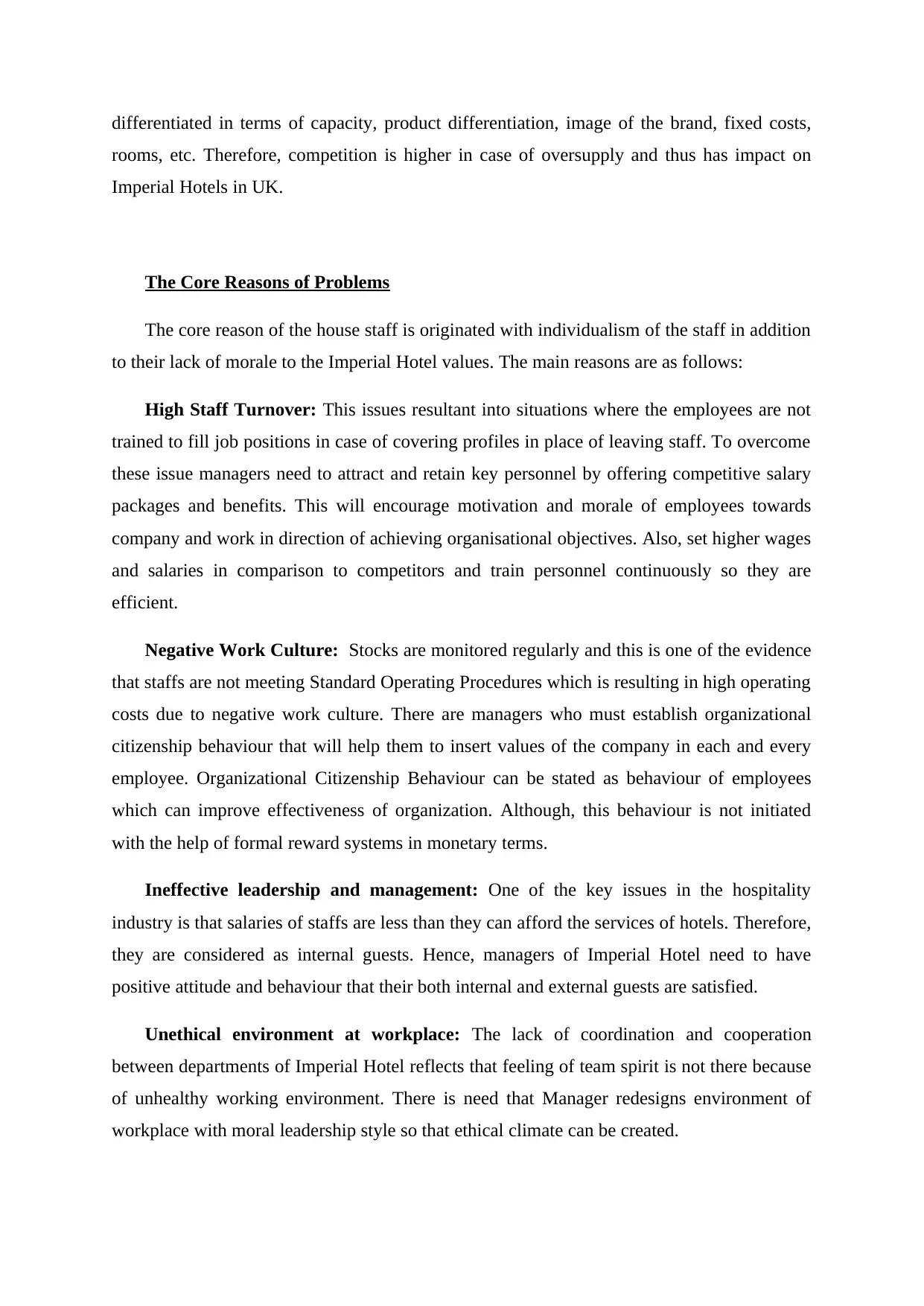
differentiated in terms of capacity, product differentiation, image of the brand, fixed costs,
rooms, etc. Therefore, competition is higher in case of oversupply and thus has impact on
Imperial Hotels in UK.
The Core Reasons of Problems
The core reason of the house staff is originated with individualism of the staff in addition
to their lack of morale to the Imperial Hotel values. The main reasons are as follows:
High Staff Turnover: This issues resultant into situations where the employees are not
trained to fill job positions in case of covering profiles in place of leaving staff. To overcome
these issue managers need to attract and retain key personnel by offering competitive salary
packages and benefits. This will encourage motivation and morale of employees towards
company and work in direction of achieving organisational objectives. Also, set higher wages
and salaries in comparison to competitors and train personnel continuously so they are
efficient.
Negative Work Culture: Stocks are monitored regularly and this is one of the evidence
that staffs are not meeting Standard Operating Procedures which is resulting in high operating
costs due to negative work culture. There are managers who must establish organizational
citizenship behaviour that will help them to insert values of the company in each and every
employee. Organizational Citizenship Behaviour can be stated as behaviour of employees
which can improve effectiveness of organization. Although, this behaviour is not initiated
with the help of formal reward systems in monetary terms.
Ineffective leadership and management: One of the key issues in the hospitality
industry is that salaries of staffs are less than they can afford the services of hotels. Therefore,
they are considered as internal guests. Hence, managers of Imperial Hotel need to have
positive attitude and behaviour that their both internal and external guests are satisfied.
Unethical environment at workplace: The lack of coordination and cooperation
between departments of Imperial Hotel reflects that feeling of team spirit is not there because
of unhealthy working environment. There is need that Manager redesigns environment of
workplace with moral leadership style so that ethical climate can be created.
rooms, etc. Therefore, competition is higher in case of oversupply and thus has impact on
Imperial Hotels in UK.
The Core Reasons of Problems
The core reason of the house staff is originated with individualism of the staff in addition
to their lack of morale to the Imperial Hotel values. The main reasons are as follows:
High Staff Turnover: This issues resultant into situations where the employees are not
trained to fill job positions in case of covering profiles in place of leaving staff. To overcome
these issue managers need to attract and retain key personnel by offering competitive salary
packages and benefits. This will encourage motivation and morale of employees towards
company and work in direction of achieving organisational objectives. Also, set higher wages
and salaries in comparison to competitors and train personnel continuously so they are
efficient.
Negative Work Culture: Stocks are monitored regularly and this is one of the evidence
that staffs are not meeting Standard Operating Procedures which is resulting in high operating
costs due to negative work culture. There are managers who must establish organizational
citizenship behaviour that will help them to insert values of the company in each and every
employee. Organizational Citizenship Behaviour can be stated as behaviour of employees
which can improve effectiveness of organization. Although, this behaviour is not initiated
with the help of formal reward systems in monetary terms.
Ineffective leadership and management: One of the key issues in the hospitality
industry is that salaries of staffs are less than they can afford the services of hotels. Therefore,
they are considered as internal guests. Hence, managers of Imperial Hotel need to have
positive attitude and behaviour that their both internal and external guests are satisfied.
Unethical environment at workplace: The lack of coordination and cooperation
between departments of Imperial Hotel reflects that feeling of team spirit is not there because
of unhealthy working environment. There is need that Manager redesigns environment of
workplace with moral leadership style so that ethical climate can be created.
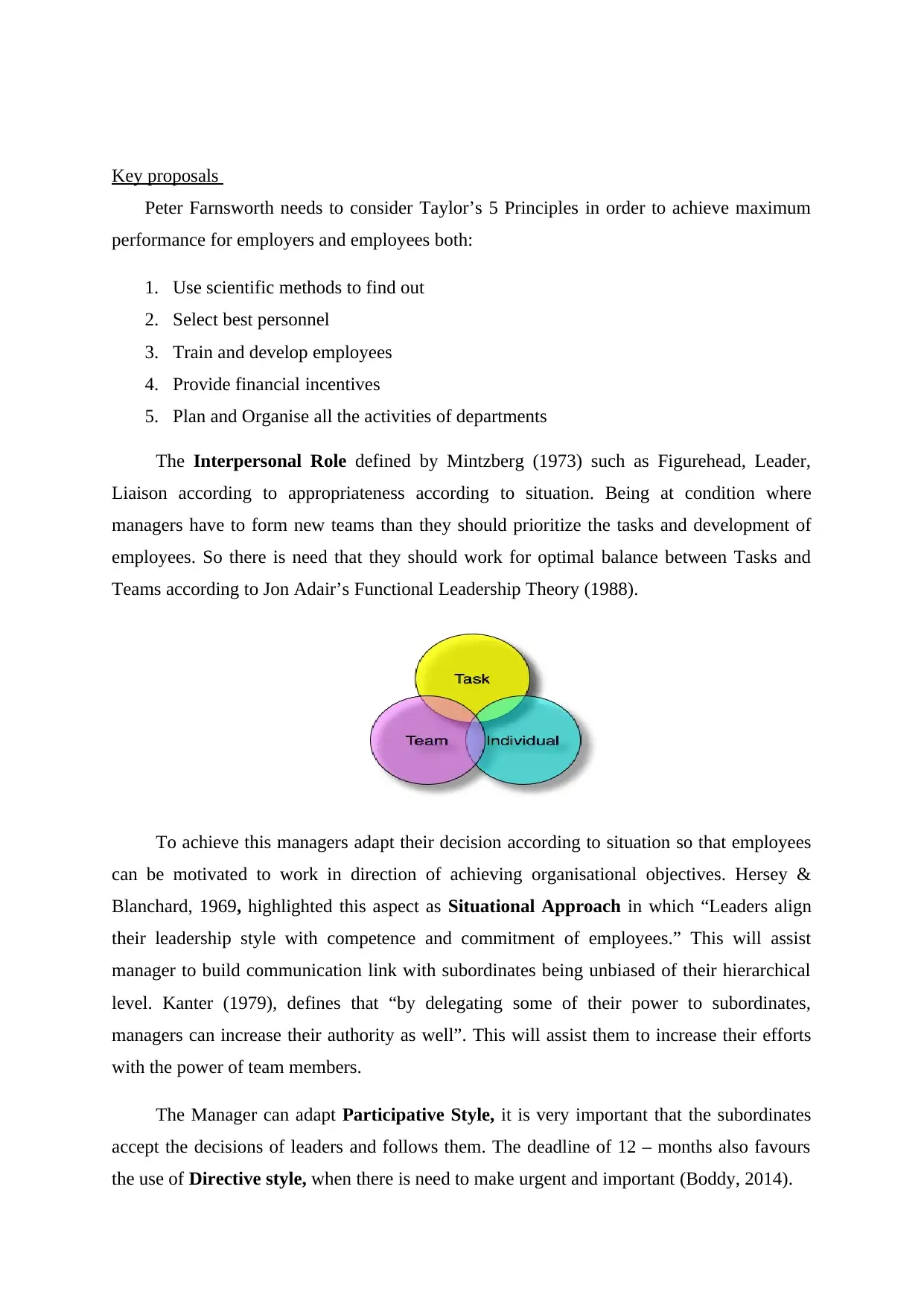
Key proposals
Peter Farnsworth needs to consider Taylor’s 5 Principles in order to achieve maximum
performance for employers and employees both:
1. Use scientific methods to find out
2. Select best personnel
3. Train and develop employees
4. Provide financial incentives
5. Plan and Organise all the activities of departments
The Interpersonal Role defined by Mintzberg (1973) such as Figurehead, Leader,
Liaison according to appropriateness according to situation. Being at condition where
managers have to form new teams than they should prioritize the tasks and development of
employees. So there is need that they should work for optimal balance between Tasks and
Teams according to Jon Adair’s Functional Leadership Theory (1988).
To achieve this managers adapt their decision according to situation so that employees
can be motivated to work in direction of achieving organisational objectives. Hersey &
Blanchard, 1969, highlighted this aspect as Situational Approach in which “Leaders align
their leadership style with competence and commitment of employees.” This will assist
manager to build communication link with subordinates being unbiased of their hierarchical
level. Kanter (1979), defines that “by delegating some of their power to subordinates,
managers can increase their authority as well”. This will assist them to increase their efforts
with the power of team members.
The Manager can adapt Participative Style, it is very important that the subordinates
accept the decisions of leaders and follows them. The deadline of 12 – months also favours
the use of Directive style, when there is need to make urgent and important (Boddy, 2014).
Peter Farnsworth needs to consider Taylor’s 5 Principles in order to achieve maximum
performance for employers and employees both:
1. Use scientific methods to find out
2. Select best personnel
3. Train and develop employees
4. Provide financial incentives
5. Plan and Organise all the activities of departments
The Interpersonal Role defined by Mintzberg (1973) such as Figurehead, Leader,
Liaison according to appropriateness according to situation. Being at condition where
managers have to form new teams than they should prioritize the tasks and development of
employees. So there is need that they should work for optimal balance between Tasks and
Teams according to Jon Adair’s Functional Leadership Theory (1988).
To achieve this managers adapt their decision according to situation so that employees
can be motivated to work in direction of achieving organisational objectives. Hersey &
Blanchard, 1969, highlighted this aspect as Situational Approach in which “Leaders align
their leadership style with competence and commitment of employees.” This will assist
manager to build communication link with subordinates being unbiased of their hierarchical
level. Kanter (1979), defines that “by delegating some of their power to subordinates,
managers can increase their authority as well”. This will assist them to increase their efforts
with the power of team members.
The Manager can adapt Participative Style, it is very important that the subordinates
accept the decisions of leaders and follows them. The deadline of 12 – months also favours
the use of Directive style, when there is need to make urgent and important (Boddy, 2014).
⊘ This is a preview!⊘
Do you want full access?
Subscribe today to unlock all pages.

Trusted by 1+ million students worldwide
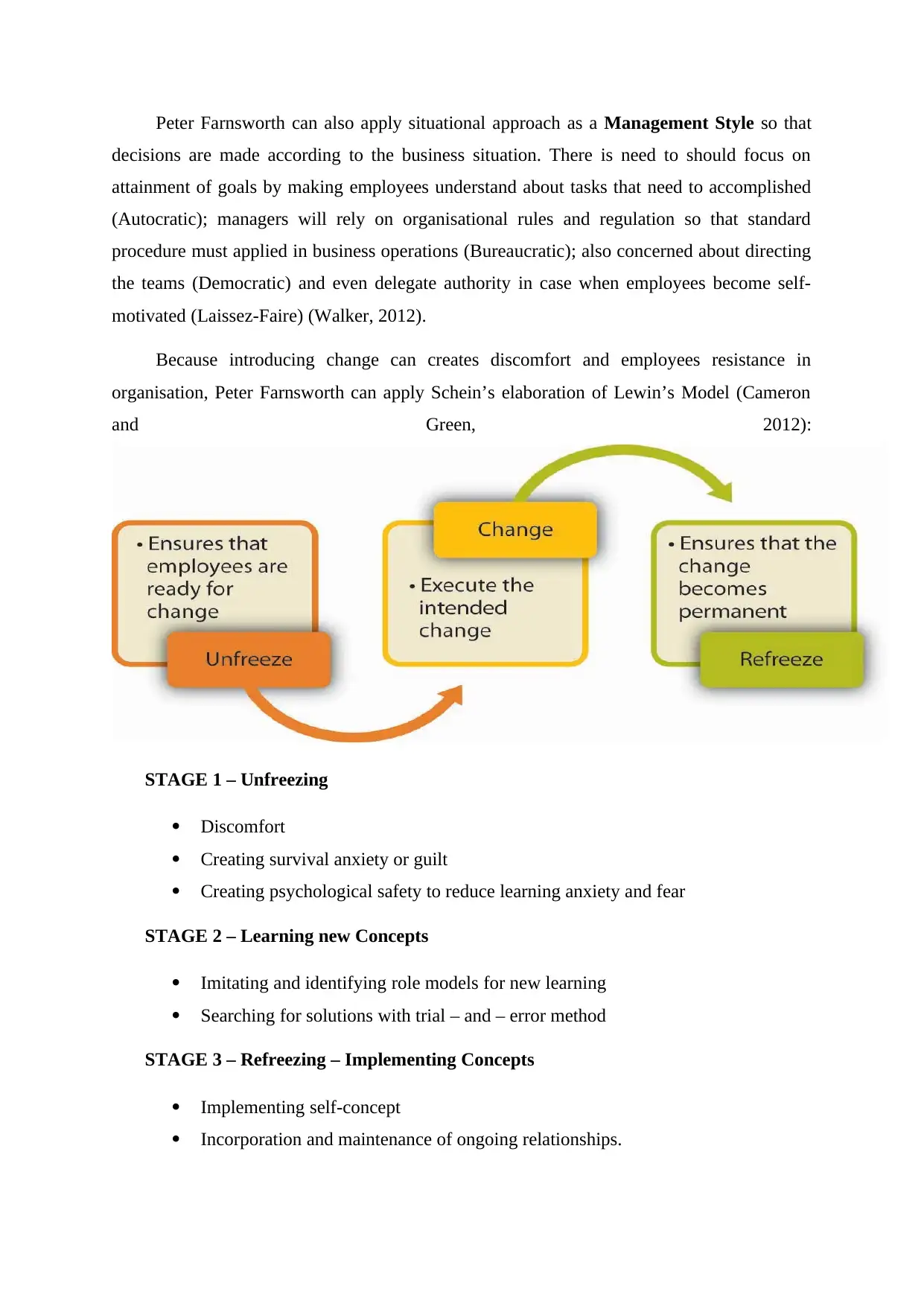
Peter Farnsworth can also apply situational approach as a Management Style so that
decisions are made according to the business situation. There is need to should focus on
attainment of goals by making employees understand about tasks that need to accomplished
(Autocratic); managers will rely on organisational rules and regulation so that standard
procedure must applied in business operations (Bureaucratic); also concerned about directing
the teams (Democratic) and even delegate authority in case when employees become self-
motivated (Laissez-Faire) (Walker, 2012).
Because introducing change can creates discomfort and employees resistance in
organisation, Peter Farnsworth can apply Schein’s elaboration of Lewin’s Model (Cameron
and Green, 2012):
STAGE 1 – Unfreezing
Discomfort
Creating survival anxiety or guilt
Creating psychological safety to reduce learning anxiety and fear
STAGE 2 – Learning new Concepts
Imitating and identifying role models for new learning
Searching for solutions with trial – and – error method
STAGE 3 – Refreezing – Implementing Concepts
Implementing self-concept
Incorporation and maintenance of ongoing relationships.
decisions are made according to the business situation. There is need to should focus on
attainment of goals by making employees understand about tasks that need to accomplished
(Autocratic); managers will rely on organisational rules and regulation so that standard
procedure must applied in business operations (Bureaucratic); also concerned about directing
the teams (Democratic) and even delegate authority in case when employees become self-
motivated (Laissez-Faire) (Walker, 2012).
Because introducing change can creates discomfort and employees resistance in
organisation, Peter Farnsworth can apply Schein’s elaboration of Lewin’s Model (Cameron
and Green, 2012):
STAGE 1 – Unfreezing
Discomfort
Creating survival anxiety or guilt
Creating psychological safety to reduce learning anxiety and fear
STAGE 2 – Learning new Concepts
Imitating and identifying role models for new learning
Searching for solutions with trial – and – error method
STAGE 3 – Refreezing – Implementing Concepts
Implementing self-concept
Incorporation and maintenance of ongoing relationships.
Paraphrase This Document
Need a fresh take? Get an instant paraphrase of this document with our AI Paraphraser
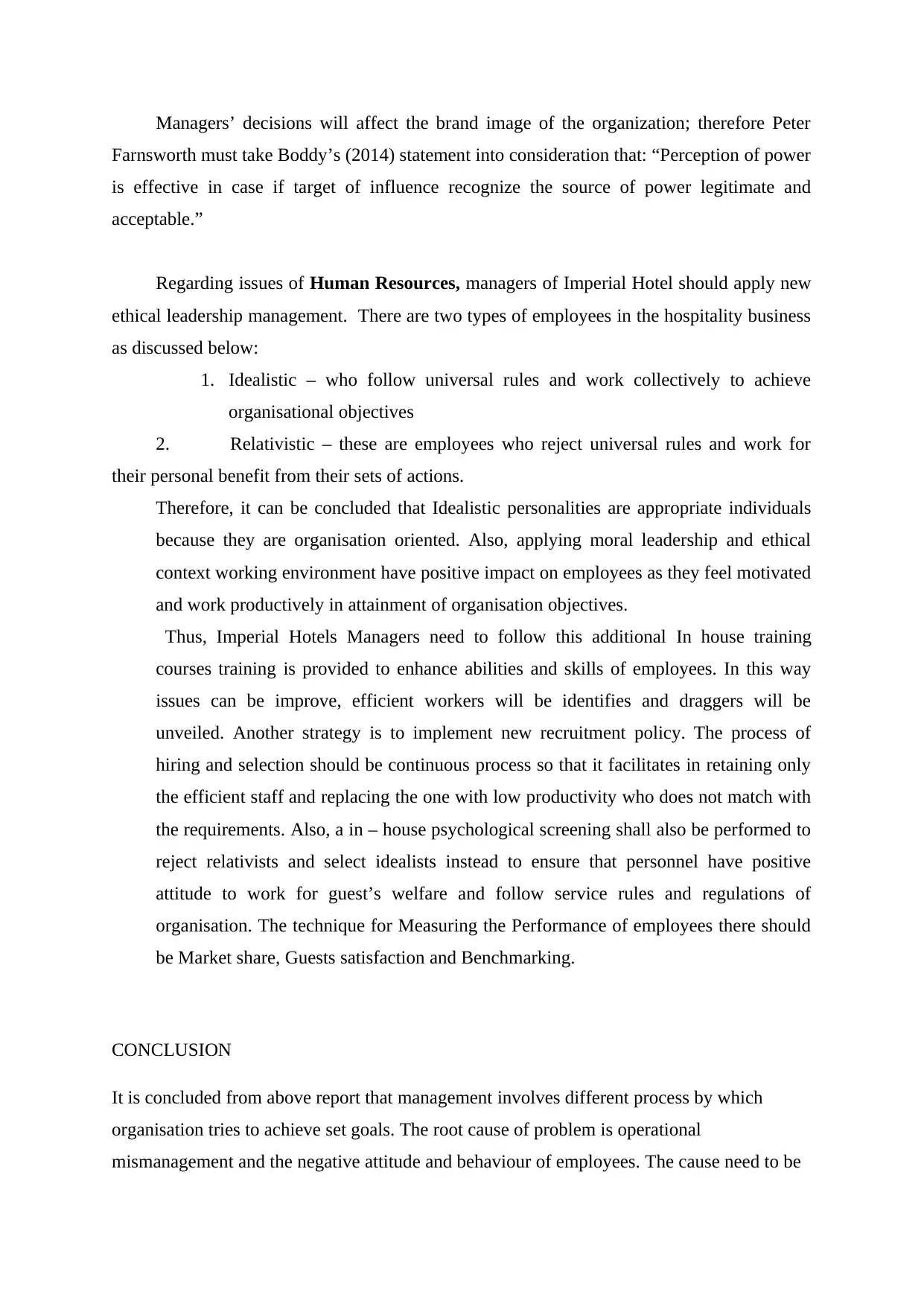
Managers’ decisions will affect the brand image of the organization; therefore Peter
Farnsworth must take Boddy’s (2014) statement into consideration that: “Perception of power
is effective in case if target of influence recognize the source of power legitimate and
acceptable.”
Regarding issues of Human Resources, managers of Imperial Hotel should apply new
ethical leadership management. There are two types of employees in the hospitality business
as discussed below:
1. Idealistic – who follow universal rules and work collectively to achieve
organisational objectives
2. Relativistic – these are employees who reject universal rules and work for
their personal benefit from their sets of actions.
Therefore, it can be concluded that Idealistic personalities are appropriate individuals
because they are organisation oriented. Also, applying moral leadership and ethical
context working environment have positive impact on employees as they feel motivated
and work productively in attainment of organisation objectives.
Thus, Imperial Hotels Managers need to follow this additional In house training
courses training is provided to enhance abilities and skills of employees. In this way
issues can be improve, efficient workers will be identifies and draggers will be
unveiled. Another strategy is to implement new recruitment policy. The process of
hiring and selection should be continuous process so that it facilitates in retaining only
the efficient staff and replacing the one with low productivity who does not match with
the requirements. Also, a in – house psychological screening shall also be performed to
reject relativists and select idealists instead to ensure that personnel have positive
attitude to work for guest’s welfare and follow service rules and regulations of
organisation. The technique for Measuring the Performance of employees there should
be Market share, Guests satisfaction and Benchmarking.
CONCLUSION
It is concluded from above report that management involves different process by which
organisation tries to achieve set goals. The root cause of problem is operational
mismanagement and the negative attitude and behaviour of employees. The cause need to be
Farnsworth must take Boddy’s (2014) statement into consideration that: “Perception of power
is effective in case if target of influence recognize the source of power legitimate and
acceptable.”
Regarding issues of Human Resources, managers of Imperial Hotel should apply new
ethical leadership management. There are two types of employees in the hospitality business
as discussed below:
1. Idealistic – who follow universal rules and work collectively to achieve
organisational objectives
2. Relativistic – these are employees who reject universal rules and work for
their personal benefit from their sets of actions.
Therefore, it can be concluded that Idealistic personalities are appropriate individuals
because they are organisation oriented. Also, applying moral leadership and ethical
context working environment have positive impact on employees as they feel motivated
and work productively in attainment of organisation objectives.
Thus, Imperial Hotels Managers need to follow this additional In house training
courses training is provided to enhance abilities and skills of employees. In this way
issues can be improve, efficient workers will be identifies and draggers will be
unveiled. Another strategy is to implement new recruitment policy. The process of
hiring and selection should be continuous process so that it facilitates in retaining only
the efficient staff and replacing the one with low productivity who does not match with
the requirements. Also, a in – house psychological screening shall also be performed to
reject relativists and select idealists instead to ensure that personnel have positive
attitude to work for guest’s welfare and follow service rules and regulations of
organisation. The technique for Measuring the Performance of employees there should
be Market share, Guests satisfaction and Benchmarking.
CONCLUSION
It is concluded from above report that management involves different process by which
organisation tries to achieve set goals. The root cause of problem is operational
mismanagement and the negative attitude and behaviour of employees. The cause need to be
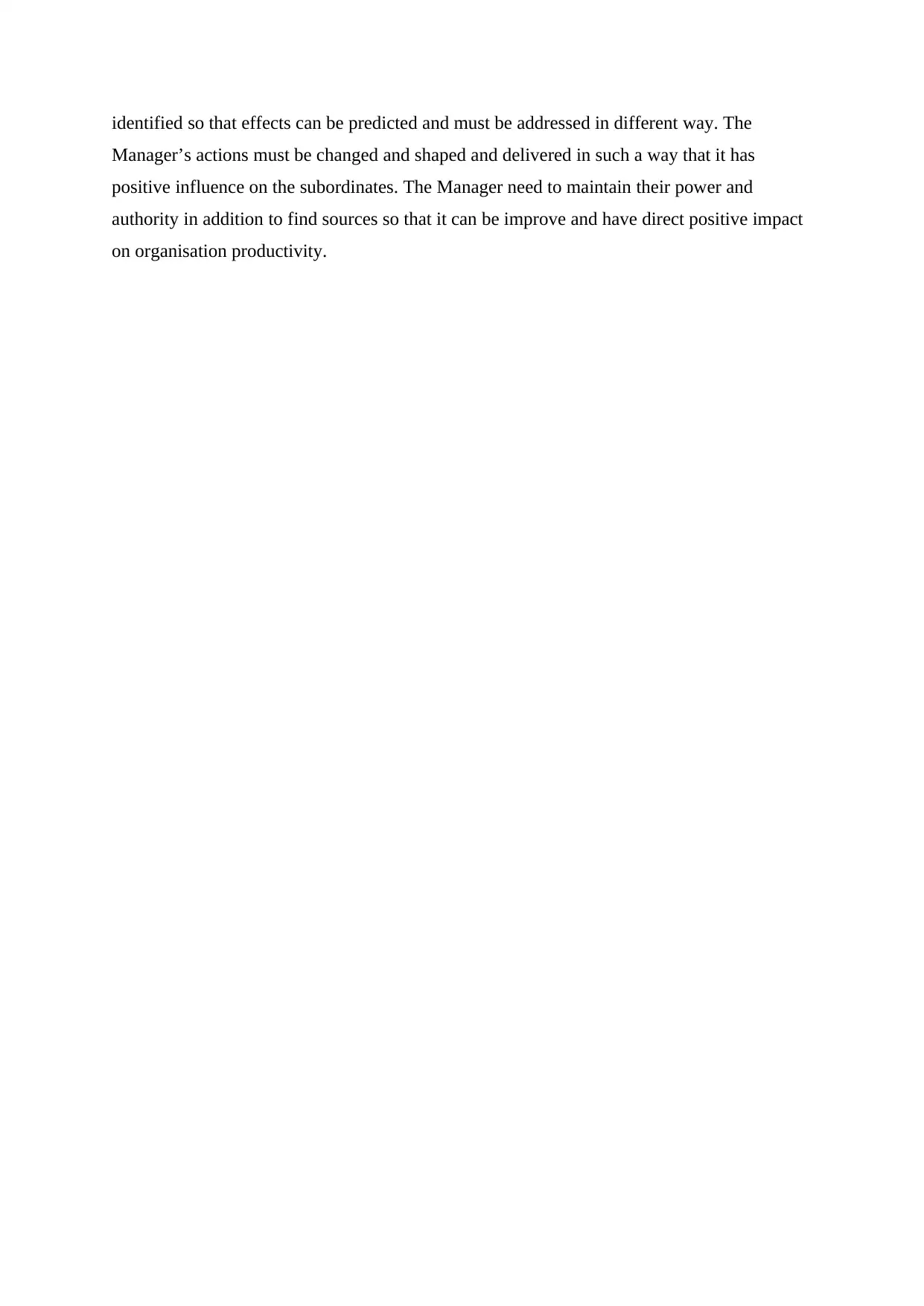
identified so that effects can be predicted and must be addressed in different way. The
Manager’s actions must be changed and shaped and delivered in such a way that it has
positive influence on the subordinates. The Manager need to maintain their power and
authority in addition to find sources so that it can be improve and have direct positive impact
on organisation productivity.
Manager’s actions must be changed and shaped and delivered in such a way that it has
positive influence on the subordinates. The Manager need to maintain their power and
authority in addition to find sources so that it can be improve and have direct positive impact
on organisation productivity.
⊘ This is a preview!⊘
Do you want full access?
Subscribe today to unlock all pages.

Trusted by 1+ million students worldwide
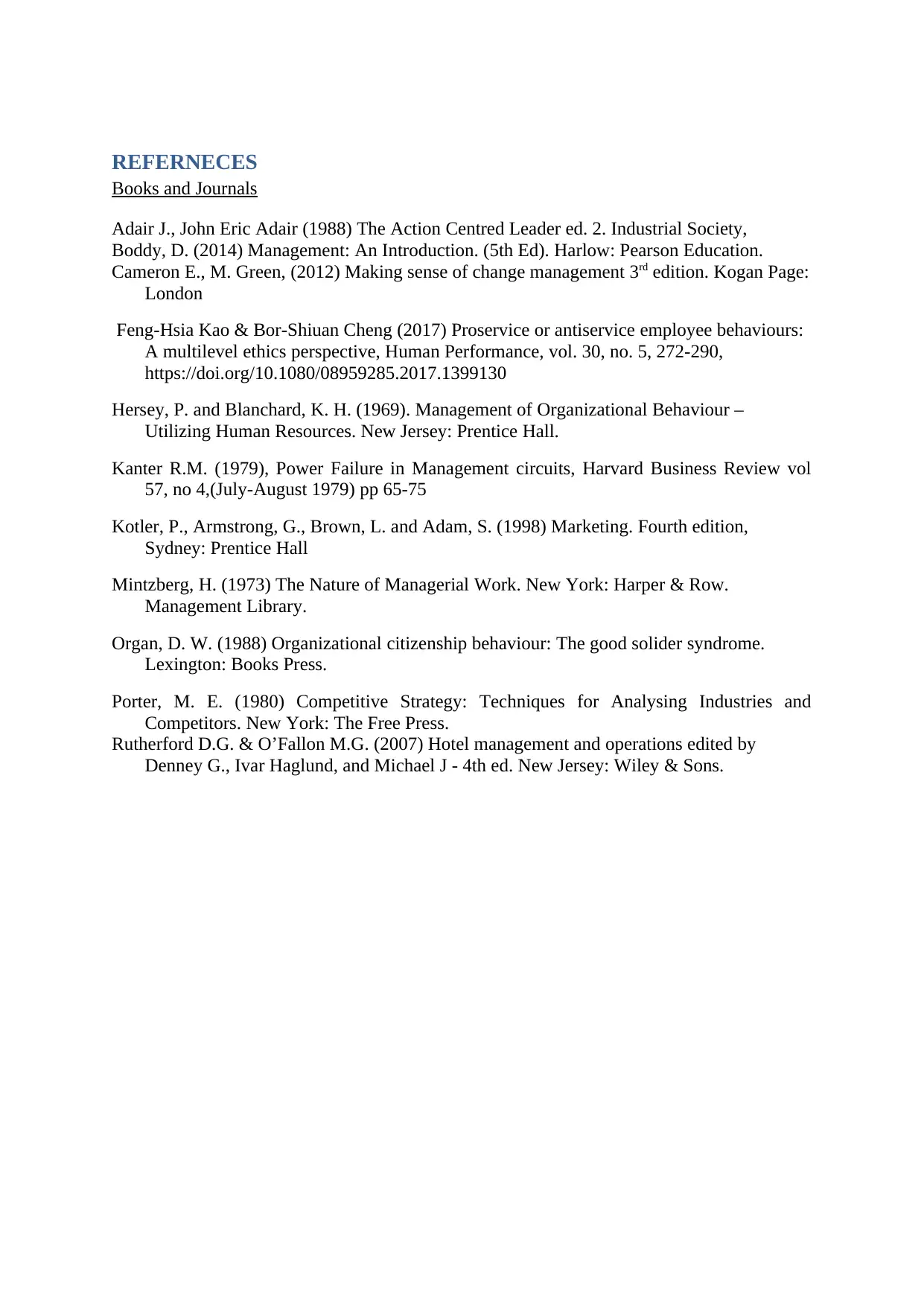
REFERNECES
Books and Journals
Adair J., John Eric Adair (1988) The Action Centred Leader ed. 2. Industrial Society,
Boddy, D. (2014) Management: An Introduction. (5th Ed). Harlow: Pearson Education.
Cameron E., M. Green, (2012) Making sense of change management 3rd edition. Kogan Page:
London
Feng-Hsia Kao & Bor-Shiuan Cheng (2017) Proservice or antiservice employee behaviours:
A multilevel ethics perspective, Human Performance, vol. 30, no. 5, 272-290,
https://doi.org/10.1080/08959285.2017.1399130
Hersey, P. and Blanchard, K. H. (1969). Management of Organizational Behaviour –
Utilizing Human Resources. New Jersey: Prentice Hall.
Kanter R.M. (1979), Power Failure in Management circuits, Harvard Business Review vol
57, no 4,(July-August 1979) pp 65-75
Kotler, P., Armstrong, G., Brown, L. and Adam, S. (1998) Marketing. Fourth edition,
Sydney: Prentice Hall
Mintzberg, H. (1973) The Nature of Managerial Work. New York: Harper & Row.
Management Library.
Organ, D. W. (1988) Organizational citizenship behaviour: The good solider syndrome.
Lexington: Books Press.
Porter, M. E. (1980) Competitive Strategy: Techniques for Analysing Industries and
Competitors. New York: The Free Press.
Rutherford D.G. & O’Fallon M.G. (2007) Hotel management and operations edited by
Denney G., Ivar Haglund, and Michael J - 4th ed. New Jersey: Wiley & Sons.
Books and Journals
Adair J., John Eric Adair (1988) The Action Centred Leader ed. 2. Industrial Society,
Boddy, D. (2014) Management: An Introduction. (5th Ed). Harlow: Pearson Education.
Cameron E., M. Green, (2012) Making sense of change management 3rd edition. Kogan Page:
London
Feng-Hsia Kao & Bor-Shiuan Cheng (2017) Proservice or antiservice employee behaviours:
A multilevel ethics perspective, Human Performance, vol. 30, no. 5, 272-290,
https://doi.org/10.1080/08959285.2017.1399130
Hersey, P. and Blanchard, K. H. (1969). Management of Organizational Behaviour –
Utilizing Human Resources. New Jersey: Prentice Hall.
Kanter R.M. (1979), Power Failure in Management circuits, Harvard Business Review vol
57, no 4,(July-August 1979) pp 65-75
Kotler, P., Armstrong, G., Brown, L. and Adam, S. (1998) Marketing. Fourth edition,
Sydney: Prentice Hall
Mintzberg, H. (1973) The Nature of Managerial Work. New York: Harper & Row.
Management Library.
Organ, D. W. (1988) Organizational citizenship behaviour: The good solider syndrome.
Lexington: Books Press.
Porter, M. E. (1980) Competitive Strategy: Techniques for Analysing Industries and
Competitors. New York: The Free Press.
Rutherford D.G. & O’Fallon M.G. (2007) Hotel management and operations edited by
Denney G., Ivar Haglund, and Michael J - 4th ed. New Jersey: Wiley & Sons.
1 out of 10
Related Documents
Your All-in-One AI-Powered Toolkit for Academic Success.
+13062052269
info@desklib.com
Available 24*7 on WhatsApp / Email
![[object Object]](/_next/static/media/star-bottom.7253800d.svg)
Unlock your academic potential
Copyright © 2020–2026 A2Z Services. All Rights Reserved. Developed and managed by ZUCOL.


